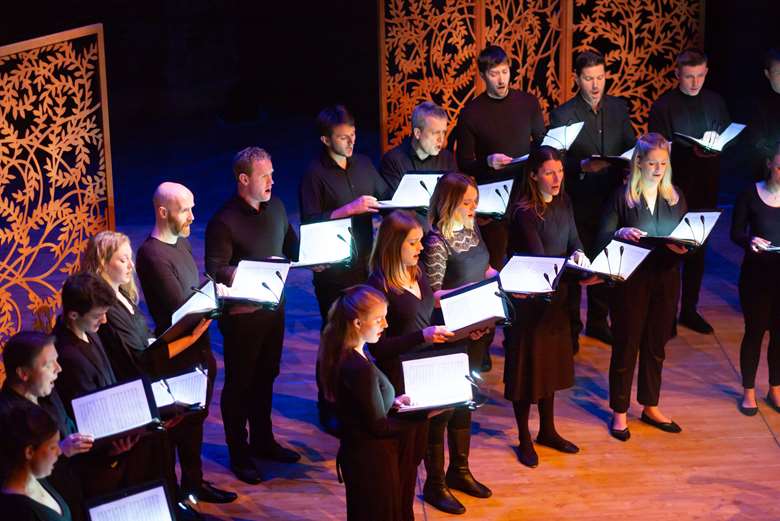ORA Singers’ Suzi Digby on two golden ages of choral music
Suzi Digby
Thursday, September 29, 2022
The ORA Singers founder and artistic director, Suzi Digby OBE, gives an insight into how she created temporal and cultural bridges through the ensembles’ upcoming performances at the Hatfield House Chamber Music Festival

Last week's state funeral of Her Majesty the Queen was marked by the premieres of two choral pieces: Like as the Hart by master of The Queen’s music, Judith Weir, and Who shall separate us? by Sir James MacMillan, one of the UK’s foremost living Catholic composers. These two composers are outstanding examples of the UK’s flourishing choral scene which has in recent decades been buoyed by a veritable tsunami of choral singing - professional, amateur and school. It marks out this last Elizabethan age as a Golden Age for choral music, much like the era of the first Queen Elizabeth 500 years earlier.
One notable difference between these two great Golden Ages is that 16th-Century composers were expected to honour and flatter their ‘Fair Oriana, beauty’s queen.’ This is quite a contrast to the circumstances of our recent Queen, who’s lack of imperiousness or vanity underpinned her distinguished 70 years rule of post-war Britain.
Before the news broke of Her Majesty’s passing, the ORA Singers had planned to celebrate the Queen’s Platinum Jubilee by creating a bridge between these two Golden Ages of choral music in a programme presenting commissions inspired by ‘court’ composer William Byrd’s famous five-part Mass alongside music by other composers of Elizabeth I’s reign. This programme, Our Queens, Elizabeth, was initially intended to be a Jubilee celebration at Hatfield House Chamber Music Festival which starts at the end of this month, with a performance in the house’s Marble Hall, beneath the famous Rainbow Portrait of Queen Elizabeth I (pictured below).


In light of the death of our beloved Monarch, we have reworked the programme to include a very special, brand new commission. Just before the Queen’s funeral, I approached composer Toby Young to set Poet Laureate Simon Armitage’s newly written poem Floral Tribute to music. We were fortunate that the Poet Laureate has granted us permission for this historic setting. Young told us, ‘Simon Armitage’s evocative poem celebrates the Queen’s quiet devotion and profound public significance. My music reflects both the public and personal experiences of grieving, inspired by my own recent experience of loss and the different stages of grief.’
For this Sunday’s matinee concert, Young’s new work will sit alongside other commissions by Roxanna Panufnik, Kerry Andrew and Roderick Williams. We open the concert with Byrd’s prayer for the sovereign O Lord, Make Thy Servant Elizabeth and our encore will be our commissioned setting of this text by Bob Chillcott for our late Queen.
Our second programme which closes the festival, launches our new series of 50 commissions. To embark on this endeavour, we commissioned British composer Joseph Phibbs and Indian composer Shruthi Rajasekar to write works on the theme of ‘The Creation of Light’, inspired by Haydn’s Creation, itself published in both English and German simultaneously making it, in essence, the first ever bi-cultural work to be published.
Given our post-Brexit state, with nationalism in the ascendance and with societies turning in on themselves during the pandemic, I felt an imperative to create bridges to other cultures with our new series of commissions. To this end, I searched for an Indian composer who could create a bi-cultural choral language combining England’s over 500-year choral tradition with that of the great Indian tradition. We were so fortunate to find Shruthi Rajasekar, a composer who is deeply steeped in both cultures. Her ORA Singers commission is a dialogue between choir and veena, an ancient Indian instrument of India dating back to 1000 B.C.E. This will be performed by Shruthi’s mother Nirmala Rajasekar, who is herself the world’s leading Veena player, who’s travelled from India for this world première.
Joseph Phibb’s commissioned work is also a dialogue between the ORA Singers and cellist and festival artistic director Guy Johnston (pictured below in the halls of Hatfield House). Phibb’s work bridges the temporal gap between our current time and the world of Haydn’s Creation. The theme of ‘the creation of light’ is deeply symbolic as we move into a new era which I am confident will be filled with great choral music under King Charles III.
 ©Ben Wright
©Ben Wright
Long live our astounding choral tradition in any form it takes, here and across the globe – it's the remarkable legacy of our two great Elizabeths.
ORA Singers will perform at the Hatfield House Chamber Music Festival which runs from 29 September to 2 October. The ORA Singers’ performances will take place on 2 October at 1pm in the Marble Hall and at 7pm in the Old Palace.


